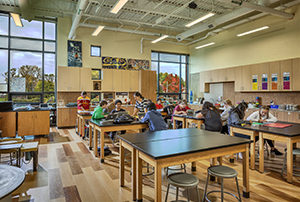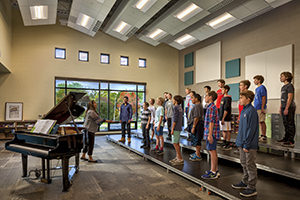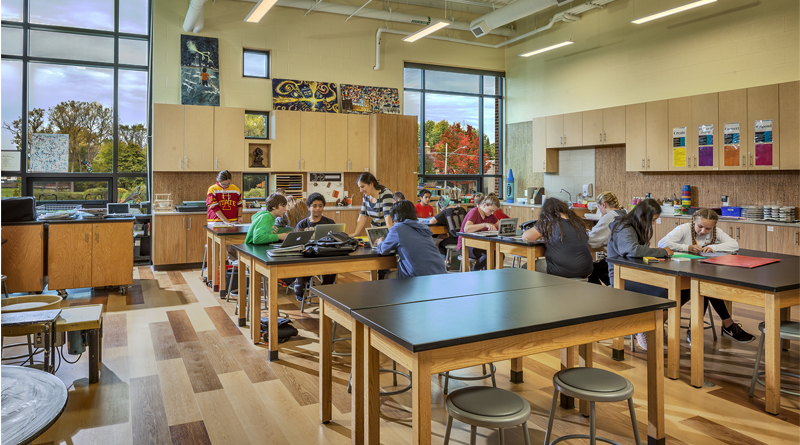Lake Bluff Middle School Built for 21st Century Learners
By Craig R. Siepka
When a major renovation of the Lake Bluff Middle School campus in Lake Bluff, Ill., was unveiled in time for the fall 2016 semester, the transformation was dramatic. Designed by Wight & Company of Chicago, the design process completely reimagined the existing mid-century modern school building. The design experience provided an opportunity for Wight & Company to step back and consider how educational environments are being shaped for both current and future students.
New Design Drivers
Efficiency and effectiveness have long been driving themes of successful school design solutions. In the past, this meant identical classrooms lined up with metronomic regularity down hallways. Variety in finishes and materials was minimal to allow for easy maintenance and clean up, the unfortunate side effect: sterile, clinical learning environments.

Perhaps that approach aligned with the unidirectional, drill and practice teaching and learning techniques of the past, but times have changed. Preparing students for the complexities of an increasingly accelerated, interconnected world — one in which they’ll be expected to absorb and analyze complex concepts, and work both independently and collaboratively to formulate creative solutions to real-world challenges — has forced significant changes in modern educational practices.
Given these dramatic changes, how can the environments in which education takes place remain unaffected? This is an era in which speed is a valued commodity. Instead of efficiency and effectiveness, school designers increasingly turn to drivers such as immediacy and relevance. New norms include adaptability, personalization and comfort.
Renovate vs. Build
Given that often both physical and financial resources are finite, wiping the slate clean and building new is often impractical and/or impossible. Sometimes it’s not even desirable, as a community’s emotional attachment to a school building may be a motivating force. In this context, capturing the spirit of place through sensitive remodeling efforts becomes the optimal solution.
These are the issues that Lake Bluff residents wrestled with as they sought to revitalize their children’s middle school experience. As the community had neither the physical nor the financial resources to construct a brand-new building — and taking into account the strong community connection to the existing structure — members opted to transform the existing school facility.
Once a decision was made to renovate the school building, community leaders, school officials and design team members engaged in focused, rigorous dialogue to develop the following renovation priorities:
- Refresh the school’s exterior while improving accessibility and staging options
- Enhance security and accessibility
- Reimagine the function and supportive characteristics of the library media commons
- Refurbish existing science labs to reflect evolving program standards
- Revitalize the interior to enhance flow and connection between spaces
Creating Cohesion
A series of additions over the years had left Lake Bluff Middle School’s identity in a confused state. Five distinct types of masonry and three different window styles as well as awkwardly placed entry stairs and ramps worked against any kind of unified statement. The district took this opportunity to refresh its public image and provide greater cohesion of the building elements. The scale and proportion of the new construction — as well as the color and size of the materials chosen — references the original building, but with a contemporary twist. At the main entrance, a waiting plaza and gathering stair hint at the unique transformation on the inside and invite students to enter.

The district’s No. 1 priority was the transformation of Lake Bluff’s Library Media Commons. The new design eliminated the existing library’s perimeter walls and reorganized the primary services. Adding a variety of mobile seating options and rooms for small group activities facilitates student interaction and allows the space to host community functions in the evenings.
To align the school’s learning spaces with its STEM curriculum and Next Generation Science Standards, the project team transformed existing science laboratory classrooms into science studios. New built-in bench seating and large windows provide a view into the remodeled studios so that learning is placed on display. Extended views to the outside infuse natural light into the further reaches of the interior, contributing to the open feel of the school.
A gathering stair now provides a physical and visual connection between levels. In conjunction with the new Library Media Commons and adjacent STEM labs, the three elements form a dynamic social and academic hub.
Forging Connections
In addition, the district wanted to improve dining spaces, staff support areas and other instructional areas on the main level. All spaces were designed and equipped to serve multiple functions and heighten daily student and staff collaborative opportunities. These bright, easily adaptable and highly flexible spaces can be reconfigured at a moment’s notice, which enabled the district to maximize its physical resources while staying within budget.
To better connect the school with its natural environment, Wight & Company took its inspiration from the nearby bluffs over Lake Michigan. The design team chose an interior color palette with hints of warm wood tones. The palette grounds the building in its surroundings and provides a soothing backdrop for the dynamic educational activities occurring within.
Since its completion, the school has been warmly received by students, teachers and the community at large. A number of education professionals from across Illinois have also asked to tour the school to see the possibilities that might be hidden within their own mid-century modern buildings. The Lake Bluff staff has welcomed this opportunity to share their experiences and show off the “new” old building.
Craig R. Siepka, AIA, LEED AP, is vice president and design principal at Wight & Company of Chicago.

